The GDPR Assessment Tools Market is estimated to be valued at USD 61.6 million in 2025 and is projected to reach USD 537.9 million by 2035, registering a compound annual growth rate (CAGR) of 24.2% over the forecast period.
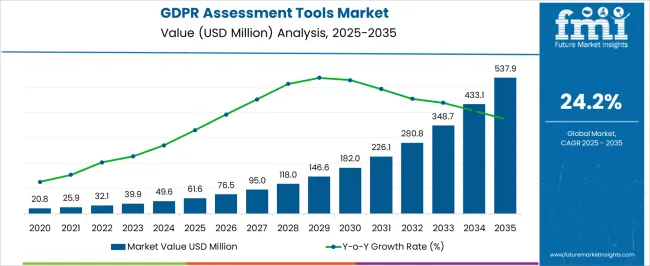
| Metric | Value |
|---|---|
| GDPR Assessment Tools Market Estimated Value in (2025 E) | USD 61.6 million |
| GDPR Assessment Tools Market Forecast Value in (2035 F) | USD 537.9 million |
| Forecast CAGR (2025 to 2035) | 24.2% |
The GDPR assessment tools market is witnessing robust adoption due to the rising importance of data protection and regulatory compliance across organizations handling sensitive customer information. Growing volumes of digital transactions, increasing cyber threats, and stricter enforcement of privacy regulations have reinforced the demand for reliable tools and services.
Enterprises are prioritizing solutions that not only ensure compliance but also build trust with stakeholders and mitigate reputational risks. Investments in AI powered analytics, automation, and cloud integration have enhanced the scope of GDPR assessment tools, enabling proactive monitoring and risk management.
With regulators intensifying audits and penalties, organizations are increasingly embedding GDPR compliance into their operational frameworks. The outlook remains favorable as businesses across industries recognize GDPR compliance as a strategic imperative to safeguard data privacy and maintain regulatory alignment in an evolving digital landscape.
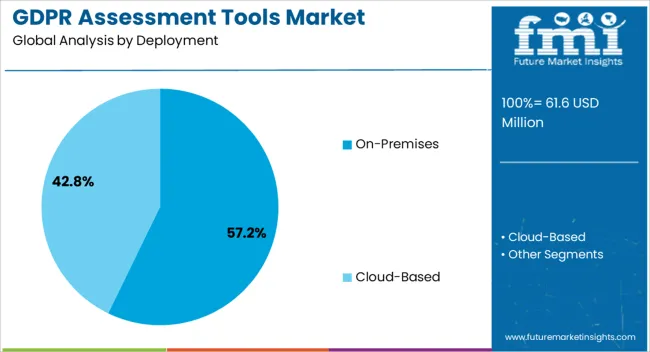
The on premises deployment segment is expected to account for 57.20% of market revenue by 2025, making it the dominant deployment model. This is being driven by the preference of large enterprises and highly regulated industries to retain direct control over sensitive customer data and compliance processes.
On premises solutions provide enhanced security, greater customization, and assurance of compliance without reliance on third party infrastructure. The segment has further benefited from investments in secure servers and dedicated IT teams, enabling organizations to manage GDPR obligations internally.
As a result, the on premises model remains the leading choice for enterprises prioritizing high levels of data protection and regulatory accountability.
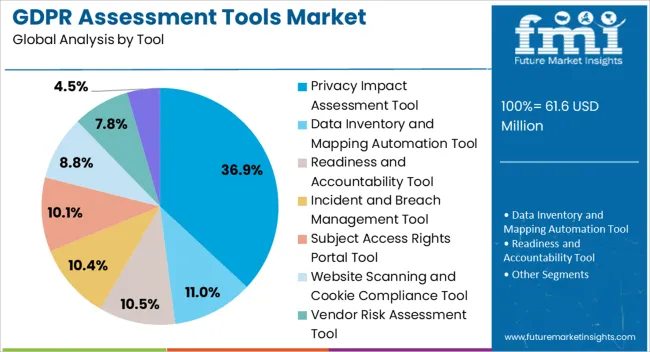
The privacy impact assessment tool segment is projected to represent 36.90% of total revenue by 2025 within the tool category, positioning it as the most widely adopted GDPR tool. Its prominence is due to its capability to evaluate potential risks associated with data processing activities and identify vulnerabilities before they escalate into compliance breaches.
Organizations have prioritized these tools to ensure regulatory reporting accuracy, enhance accountability, and reduce exposure to fines. The ability to integrate with broader compliance management systems and generate actionable insights has further strengthened adoption.
As businesses expand data handling activities, the role of privacy impact assessment tools is expected to remain critical, driving continued market leadership in this segment.
The General Data Protection Regulation (GDPR) implemented on May 2020, aims to declare the rights of EU citizens to protect the personal data and the privacy of their information. The regulation highlights the responsibility of businesses doing business in and with the EU in handling the personal data of their citizens.
The regulation gives individuals, prospects, customers, contractors, and employees more power over their data and takes away power from organizations that collect data for monetary gain.
According to this regulation, non-compliant businesses face hefty fines, which can amount to 4% of their annual global revenue. In order to comply with the GDPR, organizations must conduct a GDPR assessment, which enables organizations to identify the key risk areas and implement an action plan to mitigate these risks.
The ever-increasing number of data breaches and identity thefts continues to accelerate the adoption of GDPR assessment tools.
Risk assessments are a core component of the GDPR. Any organization within the scope of the GDPR must conduct regular risk assessments. Conducting risk assessments ensure organizations to properly identify potential security incidents and to deploy appropriate defense measures.
This GDPR assessments tools enable organizations to identify the key risks and implement an action plan to mitigate these risks covering: GDPR staff training, Data Protection Impact Assessment (DPIA), implementing GDPR compliant policies and procedures, implementing a GDPR compliant cookies consent solution on their company website and effectively managing Data Subject Access Requests (DSAR).
Thus, to stay compliant with GDPR, organizations are continuously adopting GDPR assessments tools, resulting accelerated growth in the market.
The number of breaches reported each day continues to rise. Around 160,000 data-breach notifications have been made to European authorities in the 18 months since GDPR came into force, and the number of breaches and other security incidents being reported is on the rise. This clearly states that the impact of GDPR has raised the awareness in organizations regarding their rights and obligations under EU data protection law.
According to a Linklaters analysis, GDPR-related data breach notifications across major European markets have surged by two-thirds over the past year.
Most of the data breaches were associated to the confidentiality and access by unauthorized third parties, either through malicious acts such as hacking, sending emails or documents to the wrong recipients, and the theft or loss of unsecured mobile devices and laptops. The rise in frequency of number of data breaches among organizations would drive the growth of GDPR assessment tools market.
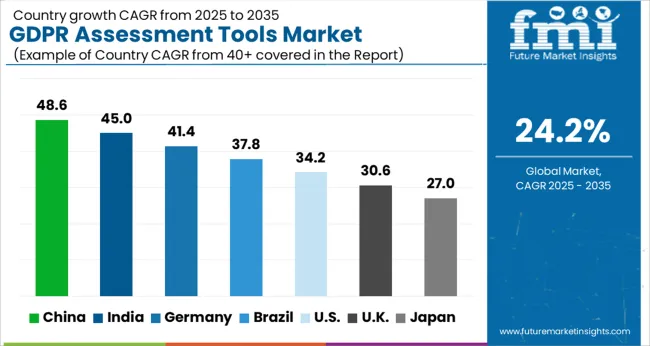
Based on geography, the European region is expected to witness the fastest growth in the GDPR assessment tools market as GDPR has been adopted by the European Union since May 2020. Though GDPR originated in Europe, it is expected to affect international markets as well. Many companies across the globe with any EU citizens as customers need to be aware of and comply with these new legal obligations to avoid fines.
Thus, organizations across the globe are continuously adopting GDPR assessment tools to stay compliant with GDPR. The high level of international businesses involving the EU is expected to influence robust data protection procedures around the world.
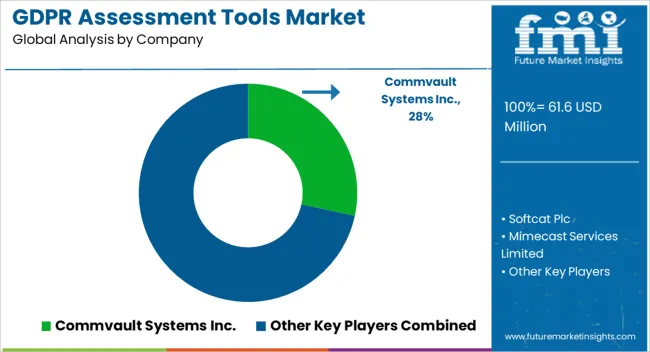
Key players in the GDPR assessment tools market are focusing on product innovation and strategic partnerships with the regional vendors to collaborate for offering advanced GDPR assessment tools to effectively comply with GDPR compliance and stay protected from high-profiled data breaches. The major players offering GDPR assessment tools include
The report is a compilation of first-hand information, qualitative and quantitative assessment by industry analysts, inputs from industry experts and industry participants across the value chain of the global GDPR assessment tools market.
The report provides an in-depth analysis of parent market trends, macroeconomic indicators and governing factors along with GDPR assessment tools market attractiveness as per segments. The report on GDPR assessment tools market also maps the qualitative impact of various factors on GDPR assessment tools market segments and geographies.
The global GDPR assessment tools market is estimated to be valued at USD 61.6 million in 2025.
The market size for the GDPR assessment tools market is projected to reach USD 537.9 million by 2035.
The GDPR assessment tools market is expected to grow at a 24.2% CAGR between 2025 and 2035.
The key product types in GDPR assessment tools market are on-premises and cloud-based.
In terms of service, consulting segment to command 44.6% share in the GDPR assessment tools market in 2025.






Full Research Suite comprises of:
Market outlook & trends analysis
Interviews & case studies
Strategic recommendations
Vendor profiles & capabilities analysis
5-year forecasts
8 regions and 60+ country-level data splits
Market segment data splits
12 months of continuous data updates
DELIVERED AS:
PDF EXCEL ONLINE
Cognitive Assessment and Training Market Report – Trends & Growth Forecast 2024-2034
Personality Assessment Solution Market Size and Share Forecast Outlook 2025 to 2035
Breast Density Assessment Software Market Size and Share Forecast Outlook 2025 to 2035
Construction Risk Assessment Software Market Size and Share Forecast Outlook 2025 to 2035
Wet Mix Plant Market Analysis and Opportunity Assessment in India Size and Share Forecast Outlook 2025 to 2035
Grinding Mill Market Analysis and Opportunity Assessment in India Size and Share Forecast Outlook 2025 to 2035
Vibrating Screen Market Analysis and Opportunity Assessment in India Size and Share Forecast Outlook 2025 to 2035
Asphalt Mixing Plant Market Analysis and Opportunity Assessment in India Size and Share Forecast Outlook 2025 to 2035
Road Milling Machine Market Analysis and Opportunity Assessment in India Size and Share Forecast Outlook 2025 to 2035
Hand Tools Market Size and Share Forecast Outlook 2025 to 2035
Key Players in the Hand Tools Market Share Analysis
Power Tools Market Size and Share Forecast Outlook 2025 to 2035
Smart Tools Market Size and Share Forecast Outlook 2025 to 2035
Power Tools Industry Analysis in India - Size, Share, and Forecast Outlook 2025 to 2035
Baking Tools Market Size and Share Forecast Outlook 2025 to 2035
Kitchen Tools and Accessories Market Size and Share Forecast Outlook 2025 to 2035
Carbide Tools Market Growth - Trends & Forecast 2025 to 2035
Drilling Tools Market Size and Share Forecast Outlook 2025 to 2035
Striking Tools Market Size and Share Forecast Outlook 2025 to 2035
Survival Tools Market Trends - Growth & Forecast 2025 to 2035

Thank you!
You will receive an email from our Business Development Manager. Please be sure to check your SPAM/JUNK folder too.
Chat With
MaRIA